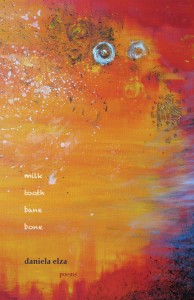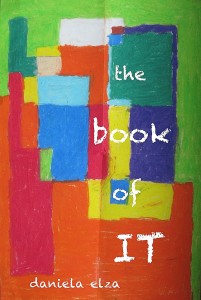review reposted: small pieces loosely joined
Posted by Daniela Elza on Mar 10 2007
[Note: I am re-posting a book review here that I wrote in 2002. I noticed that I am still linked in the review section but the link goes to a site that no longer exists. And I’d rather it go to Strange Places. I have not altered much, other than some surface editing. I wanted to keep the immediacy of my response as it occured at the time. I may decide to do an experiment with myself and re-read the book and write a review at that time as well. It will be the same book with me five years different. I am also going to use this oportunity to share a poem that emerged around three favorite quotes from the book and was consequently published in Paideusis (page 97) with six other poems.]
It is hard to review David Weinberger‘s Small Pieces Loosely Joined in a few paragraphs. There are so many ideas I would like to explore. I would like to get lost in the back alleys of a book that embraces philosophy, language, the Web phenomenon, and through these makes a statement about the human condition. What is the Web? Where is it? And what can we learn about ourselves from it?
One thing that I find important to mention at the beginning is that I am no geek, just married to one. This makes me a perfect guinea pig for how readable and how understandable a book about the web is to a layperson. My background is linguistics, just from that perspective the book gives me a lot to think about.
The main boulevard is outlined in the contents. Weinberger explores how the Web is changing our understanding of concepts like Space, Time, Perfection, Togetherness, Knowledge, Matter, and Hope. He dedicates a chapter to each. Within these chapters he brings up more concepts which are changing their meanings as they get incorporated in the terminology of the Web.
Bit by bit is how it all comes to us on the Web, and the bits that we embrace are “physical and mental at the same time” and in time they become a sequence, and the sequence becomes a story, and we give in to the telling because we are made of the same stuff, the physical and the mental, and we know this is where the meaning lies, and tells the truth.
Hyperlinks are, according to Weinberger, what makes the web. They bring colour to the web. They are the relationships that we choose to be in. The value of a page on the web has a lot to do with what it links to. It is in our nature to seek meaning, to make connections and the web is a place we go to to seek these links. We link because we care. A page with no links is obsessed with itself, it is a dead end that wants to keep you there.
Weinberger on many occasions presents a default philosophy about reality or a certain concept. Then he goes through the process of making that concept human again. He peels away layer after layer of conventional thinking and invites us to join in the building of a new concept, be it realism or document or morality. He tweaks the default settings that we are brought up with. Challenging old assumptions is hard to do. First you have to recognize and admit the assumptions that you want to challenge. Only then can you hope to replace them with ones that are more true to you.
The presence of the Web, the existence of this alternate world which is governed by different laws, intensifies this process of re-examining, of re-phrasing, of having to separate place from space. These “laws” may seem paradoxical when we transfer our knowledge of the the real world onto our need to understand the Web world.
Small Pieces Loosely Joined is one of those books that drives a wedge in the reality we blindly live in and assume we know. This split allows us a peek inside our default understanding. The Web is not a world completely separate from our reality. It is within the confines of the real world. There is a give and take between the two. We buy something online and somewhere in the real world real money come out of a real account. We sue someone because of what they do on the web, and there is a court case in a real court with real baffled lawyers and judges. This approach lends us a different pair of eyes, ones of this world and ones of a different world. We create the Web willingly and it is not a default reality, but one we have to practice and perfect and engage our passions in order to build.
We, like the web, are very adaptable and resilient creatures and live with paradoxes. Sometimes even our metaphors will not rescue us. Sometime we have to break down and admit that metaphor is a dangerous thing to play with. Especially when it comes to settling a court case in the real world about what is going on in the web world. What are the implications when a judge has to decide if there has been trespassing on the web? The fact that there are no physical bodies or real estate on the web should make things at least a little uncomfortable and quite abstract. Do we redefine trespassing? According to a George Lakoff hypothesis we need to make the abstact concrete through metaphor in order to be able to think about it. I missed Lakoff in this book. Lakoff talks about the embodied nature of knowledge, about the way metaphor shapes our thinking, the way we think of the world throught metaphor, the dangers hidden within metaphors.
Weinberger exposes a gap that needs to be bridged. A gap we need to be willing to see before we make an attempt to cross. We are creatures who think in metaphor and analogy and then swear that we have been completely objective about the biases those two inevitably bring.
Weinberger puts complex ideas about reality, human nature, and the web in simple and easily accessible language. He does acknowledge that the web is a messy place and its beauty comes from its decentralized nature. A nature that allows it to fall victim to base uses and disreputable purposes. Despite that it is the grounds on which a new kind of interaction is built. One in which authority comes from authenticity. One in which we write ourselves into existence. This side of the Web, Weinberger believes, has not been hyped enough yet. Its importance is yet to be witnessed.
Weinberger is playful, funny, and yet very serious and maybe because of that touches places deeper than the rational and our-ready-to-reason-this-out attitude. This is a special kind of knowledge. One that pulls the threads in from different directions to weave a sweater that some may say is impossible to exist. Even worse, they may actually say they do not see it, even when you are wearing it.
There is a lot going on under that distracting material and immaterial language. But that is all we have to transfer a thought from one head to another. Weinberger’s language tries to bring a human face to academic issues. Because of that his ideas seem laden with an authenticity and a true ring, the kind you cherish when talking with your friend. The intimate tone of his book is proof itself of that which he speaks of.
The web is a little broken, so are we. Maybe that is why we are attracted to each other. We can use the web to perfect ourselves, just like the web uses us to perfect itself.
Read this book, it has a unique vision. The map is never the territory, no matter how many lines I draw and how many words I offer the book will always be its own territory to be explored and perfected in the reader’s minds that get all passionate about it. Give a copy to your best friend, then go for a long walk and talk about it.




